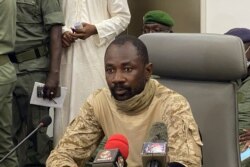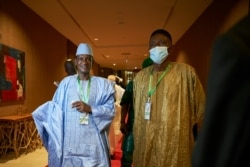France is calling for an immediate return to civilian rule in Mali following a military coup in the West African nation this week. The former colonial power has worked to stabilize the country since leading a 2013 military operation to oust extremists in the north.
With Mali the cornerstone of French-led efforts to roll back jihadists in the Sahel, President Emmanuel Macron on Wednesday repeated his call for a quick transition back to civilian rule.
For the French government, it is a moment of uncertainty on whether it will see a return on what it invested to stabilize its former colony under the now ousted president, Ibraham Boubacar Keita — seen as an ally of Paris.
Will the junta now in charge change its relationship with the former colonial power?
Opposition coalition leader Choguel Maiga thinks that is unlikely.
Choguel Maiga explains that any politician in Mali who is willing to lead the country according to the people’s aspirations has no interest in clashing with France, the main military, strategic and economic partner.
Real politics should prevail, he thinks. However, he wishes to change what he describes as some malpractice in the relationship and this kind of transition, he says, is a good opportunity to clear some misunderstandings.
Paris, which has more than 5,000 troops stationed across the Sahel region including in Mali, joined the United States and others in condemning the coup with Foreign Minister Jean-Yves Le Drian saying in a statement that France "strongly reaffirms its full attachment to Malian sovereignty and democracy."
In Mali’s capital, Bamako, army Colonel Assimi Goita introduced himself on Wednesday as the new military leader of the country.
Goita told journalists the junta, which calls itself the "National Committee for the Salvation of the People" was now in charge and said "Mali is in a situation of socio-political crisis with no more room for mistakes.”
The soldiers said they favor a civilian political transition and new elections.
The coup took place after weeks of protests led by a coalition of political parties and civil society leaders demanding president Ibrahim Boubacar Keita’s departure.
The main opposition coalition M5-RFP cheered the move by the military officers and said it would work with them on "developing a roadmap."
Leader Choguel Maiga told VOA that the military coup was the achievement of the people’s victory in Mali after months of protests. He considers the putsch as a rescue and what comes next will depend on how the junta will deal with political forces in Mali. For now, soldiers announced a civilian transition but it is not clear yet what they meant.
The 15-nation West African bloc ECOWAS, which had tried in vain to mediate in the long-running political crisis, said it would suspend Mali from its internal decision-making bodies.
Speaking to VOA from Dakar, Gilles Yabi, the founder of WATHI, a civil society organization that describes itself as a citizen think tank in West Africa, said this coup is warning to other leaders in the region.
“You have the president of Ivory Coast, Alassane Ouattara, the president of Guinee, Alpha Conde, facing political tensions in their countries and what happened in Mali could also happen in other countries. In the region, people are unsatisfied with the way countries are governed and the conditions of the coming elections," he said.
Rallies are scheduled to take place on Friday in Bamako and nationwide to celebrate what opposition leaders are describing as “the Malian people's victory.”









